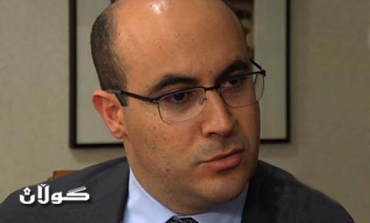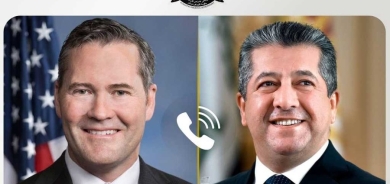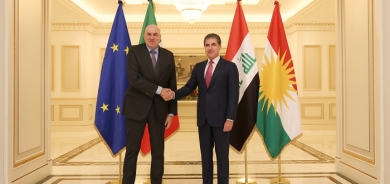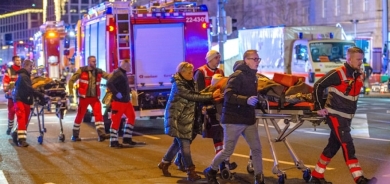Aram Nerguizian to Gulan Magazine: The Russians and Chinese can not continue to support the Assad Regime
February 21, 2012
Exclusive Interviews

The Professor Aram Nerguizian is a visiting fellow with the Arleigh A. Burke Chair in Strategy at (Center for Strategic and International Studies – CSIS), where he conducts research on the Middle East and North Africa. He specializes in security, politics, and military development in the Middle East, focusing on specialized themes such as the Lebanese military, U.S. and Iranian strategic competition in the Levant, and challenges to civil-military relations and force development in post-conflict and divided societies.Nerguizian has authored or coauthored a number of Burke Chair books and reports at CSIS. His reports include Instability in Syria: Assessing the Risks of Military Intervention; U.S.-Iranian Strategic Competition: The Proxy Cold War in the Levant, Egypt & Jordan; The Arab-Israeli Military Balance: Conventional Realities & Asymmetric Challenges; The Gulf Military Balance in 2010: An Overview; and The Lebanese Armed Forces: Challenges and Opportunities in Post-Syria Lebanon. His books include The North African Military Balance: Force Developments in the Maghreb and Israel and Syria: The Military Balance and the Prospects of War.We contacted the Professor Nerguizian to discuss the current situations in Syria, and he responded to our questions in an exclusive interview to Gulan Magazine as the following:* First of all; how do you describe the current situation in Syria regarding the violence done by the Assad Regime against people?
- Well; in the wake of the withdrawal of the observing mission from the Arab League you had a drastic escalation in violence on the part of the Assad Regime. It comedown critically hard on the cities of Himms as well as Hammah, and other districts as well. You have a mounting civilian deaths and it includes women and children. You have a regime that is bolstering its essence of capabilities, in part because the military has absorbed the effects of the mounting insurrection on the part of the Free Syrian Army. There is mounting international pressure, not just from the west, the Gulf States or the leading Arab League, but also from key regional and international allies. The Russians and Chinese can not continue to support the Assad Regime. Without some kind of a diplomatic resolution, the position of the international players, like Russia, has been to support the Assad Regime at the level of the Security Council, but only in so far as there can be some kind of a constructive, diplomatic, and political path in the country. Now the cycle of violence has escalated, if it continues as such it will go increasingly difficult for the Russians or any international actors that is keeping the sideline to effectively manage a diplomatic outcome. And in that kind of scenario, it far more likely that the cycle of violence in Syria to escalate, that we could see the emergence of a sectarian civil war in an already divided Syria, and an opening-up of the country as an arena for competition between regional states with the stake in Syria’s future; it even includes Saudi Arabia, Turkey, Iraq, Iran, and neighboring states such as Israel and Lebanon.
* We see that the security forces have started targeting the public services’ sources; water and power-supply for instance, this leaves the people in a disastrous situation in this cold winter, and the only hope lies in the International Community to intervene. In your view; how far do you believe that the International Community will keep silence and standstill?
- Well; it has been a deep struggle within the International Community, on the one hand you have the visions about states that are willing to be – at least at the rhetoric levels – supportive of some kind of intervention, versus states; like Russia, China, and other developing countries including India, Brazil, and South Africa, they are far more worry of another Libyan-style military intervention. Syria is not Libya; Syria has a far larger population, and has far denser urban spaces. Any military intervention would have to eliminate any kind of Syrian infrastructures, and doing so would not be possible – given the level of density of population in Syria – without mass casualties, which would go in the hundreds if not thousands. It is also a country that is located at the centre of an Arab-Israeli politics. Any intervention in Syria will destabilize its neighbors. Lebanon already has sectarian imbalance, and Lebanon Sunnis looking closely to Syria to see how things shape-out. In a scenario where you have a destabilized Syria where the regime is either no longer able to control or a looses a significant control in terms of division in the leadership of military, any external intervention is likely as trigger of broader sectarian conflict in a country like Lebanon. And Israel also faces real worries; Israel would like to see the Assad Regime move along the path of a more marginal foreign policy role. And any Syria – in the long term – that doesn’t play as a bridge for Iranian influence is a positive for Israel. But at the same time; there is no political, social-economical, or security counterparts in or outside Syria today that can effectively and quickly takeover for the Assad Regime. All of this makes the risks of a broader intervention far more complex, because there are also countries like Iraq and Iran that have their own interests. The Iranians for example count on the Assad regime and Syria as their core regional Arab ally. And Iraq’s Shiite majority also looks to Syria and see the cycle of instability that could bring to power Sunni elements that are either backed by a rather strong lines – Saudi foreign policy lines, or a Qatari position; they are also support certain Salafi views – as a potential risk for their own security and stability. All of this makes the scenario deeply problem and complex. Turkey also faces worries. There is no simple solution for Syria, there is no easy diplomatic solution, and there is no easy military solution. The same was true of Libya, but Libya did not have the kinds of chemical and biological weapons as Syria has, and it didn’t have that level of military capabilities – a military as large as the Syrian one – and we have fundamentally underestimated the level of resistance of the Syrian military in the wake of another instability that come back and hit hard, and to maintain the level of unity and cohesion, despite some defections.
* The International Community suggests Assad to leave the power peacefully, and Russia tries to convince Assad to do so, and the whole world believes that the Syrian regime is neither able to make reforms nor is ready to relinquish power. In your view; how is it possible to rescue this nation, and how far do you think that Russia will be able to convince Assad relinquish power?
- Well; Russia is really putting its international prestige on the line when it comes to Syria. And in many ways other countries are the same; Qatar, Saudi Arabia, the Gulf States and the Arab League have also stake their reputations on how to shape events in Syria, and have so far been unsuccessful to shift things in a way that is positive. The Russian position is pragmatic; it is grounded in the idea that they shouldn’t be directing intervention either by Arab States or by the International Community, that a rapid transition away from Assad in the short term is likely to create political and security vacuum, that any kind of deepening division or deepening conflict is likely would be a civil war where you will have thousands of casualties with deeply destabilizing prospects for every player interested in the outcomes. So; the Russian position is essentially based on the premise no intervention and they gradual negotiated power-sharing structure. The irony of the Russian position is that it is not that far from the Arab League position. The Arab League position is based on the premise that there needs to be some kind of a power-sharing arrangement, or else; Syria will fall into civil war. This is also the position of the Russians, the United States, and the other key actors. But where the Russian position differs is that; first of all, they focused on negotiating in a framework between the Assad regime and the opposition in the country as oppose to opposition forces outside the country such as the Free National Council that are backed by the EU, US, and Gulf States. They also are trying to promote a structure whereby Assad will exit at the end of his term in 2014, he will not re-stand for election, and it is a way that transition is quickly but without drastically shifting things in ways that could destabilize the country. Arguably; there are also possibilities that he could leave sooner, but that would have to be part of a negotiated framework. At the end of the day; the Russian position is pragmatic, it is based on the fact they have their own interests, it has great power politics, they are competing with the west, and they are balancing with countries like China, India, and other key developing states to present the bold-work against what they view as a deeply destabilizing policy when it comes to Syria. They understand that the US, the west, and the Gulf States are concerned with Iran’s growing interests in the Gulf, and they understand that those states also look at Syria as the weak point of the Iranian influence in the region. However; they also recognize that some kind of a negotiated structure is better than instability and uncertainty which could last for decades.
Transcription: Qane’ Kakeiy















